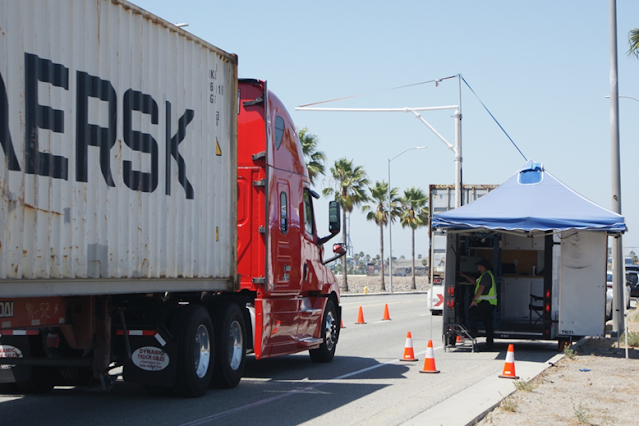California's Clean Truck Check: Moving Heavy-duty Vehicles Towards a Cleaner Future
To stay updated on Clean Truck Check, visit the TruckStop website, subscribe to the CARB GovDelivery email list, and follow CARB TruckStop on X (formerly known as Twitter) @CARBTruckStop.
Despite comprising only about 3% of California's total on-road vehicle fleet, heavy-duty vehicles play a significant role in statewide mobile air pollution. In 2020, they were responsible for approximately 52% of on-road mobile source oxides of nitrogen (NOx) emissions and 54% of on-road mobile source particulate matter (PM) 2.5 emissions. About 70% of Californians live in areas that exceed the federal ozone and PM 2.5 standards (CARB, 2020d). These emissions pose serious threats to human health and the environment. Exposure to PM or ozone can lead to severe adverse health effects, including asthma, cardiopulmonary and respiratory diseases, and premature deaths.
Clean Truck Check (formerly known as the Heavy-Duty Inspection and Maintenance Program) was approved by the California Air Resources Board (CARB) in 2021. This regulation aims to reduce toxic emissions from heavy-duty vehicles through regular testing and inspections, ensuring proper maintenance and prompt repairs when needed. Additionally, the program seeks to create a level playing field for businesses operating these vehicles, whether they are registered in-state or out-of-state. The regulation impacts nearly all non-gasoline vehicles with a Gross Vehicle Weight Rating (GVWR) over 14,000 pounds that operate within California, even if they are registered in a different state.
Clean Truck Check is projected to make a substantial difference in emission reductions. Through 2050, it is estimated to prevent 6,219 tons of PM emissions and 684,669 tons of NOx emissions (CARB, 2021). Furthermore, the program is expected to prevent more than 7,600 cardiopulmonary-related deaths, nearly 2,500 hospital visits, and 3,500 emergency visits, resulting in total monetized health benefit savings of $76.2 billion (CARB, 2021). These significant health improvements will be felt statewide, with particularly beneficial effects in densely populated regions like the South Coast, San Joaquin Valley, and Bay Area, where federal ozone and PM 2.5 standards are still unmet and disadvantaged communities bear a disproportionate burden from air pollution.
Ensuring
that out-of-state vehicles are regulated is critical for improving air quality
in California. Approximately half of the vehicles operating in California each
year are out-of-state vehicles. These out-of-state vehicles contribute
significantly to total heavy-duty vehicle emissions, responsible for
approximately 27% of total NOx emissions and 36% of total PM2.5 emissions
(CARB, 2021).
Clean Truck
Check requires semiannual compliance testing for nearly all affected heavy-duty
vehicles to ensure the emissions control systems are regularly maintained and to
reduce the likelihood of emission-related issues going unaddressed for
prolonged periods. To ensure consistency in the testing process, CARB requires
any individual performing vehicle compliance testing to complete CARB’s
approved training course and pass the exam to obtain a testing credential.
The program
will ensure compliance through effective enforcement tools. Like the Smog Check
for light-duty vehicles, compliance with Clean Truck Check is tied to
California DMV registration. Owners of California-registered heavy-duty
vehicles must demonstrate compliance to renew their DMV vehicle registrations.
Out-of-state vehicle owners must also meet testing requirements and obtain a
valid compliance certificate to operate legally in California. Additionally, freight
contractors, applicable freight facilities, and brokers are required to verify
fleet and vehicle compliance.
CARB is
also utilizing Roadside Emissions Monitoring Devices (REMD) to support
enforcement efforts. These devices detect potentially high-emitting or
non-compliant vehicles, helping identify candidates for compliance tests. In addition
to CARB performing field inspections for compliance with Clean Truck Check, the
California Highway Patrol (CHP) will also have the authority to conduct field
inspections during their routine safety checks at weigh stations and roadside
locations, enhancing enforcement presence in the field.
 The
Portable Emission Acquisition System, or PEAQS, is a roadside emission
measurement system that captures a portion of a passing vehicle’s exhaust as it
drives through to determine an emission snapshot in real-time
The
Portable Emission Acquisition System, or PEAQS, is a roadside emission
measurement system that captures a portion of a passing vehicle’s exhaust as it
drives through to determine an emission snapshot in real-time
